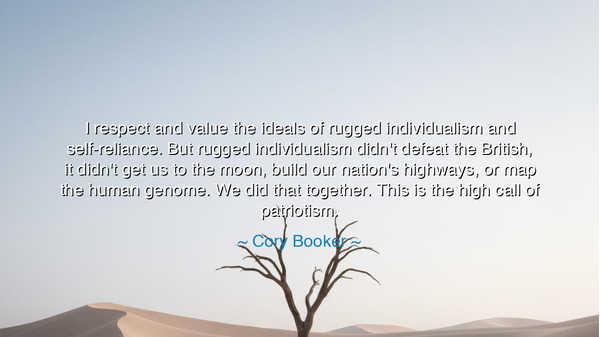
I respect and value the ideals of rugged individualism and
I respect and value the ideals of rugged individualism and self-reliance. But rugged individualism didn't defeat the British, it didn't get us to the moon, build our nation's highways, or map the human genome. We did that together. This is the high call of patriotism.






The words of Cory Booker—“I respect and value the ideals of rugged individualism and self-reliance. But rugged individualism didn’t defeat the British, it didn’t get us to the moon, build our nation’s highways, or map the human genome. We did that together. This is the high call of patriotism”—resound like the voice of an elder calling to the firelit circle of the tribe. They honor the spirit of personal strength while proclaiming a higher truth: that the destiny of a people is forged not by solitary hands, but by the union of many working as one. This is a teaching both ancient and eternal—that the greatness of a nation flows from the harmony of its individuals bound together by shared purpose.
The ancients understood this balance well. The warrior must be fierce in himself, but the phalanx of Sparta stood because each warrior held his shield not for his own body, but for the comrade at his side. So too in Rome, where citizens built aqueducts, roads, and laws—not by solitary effort, but by the collective will of the republic. Booker’s words are the echo of this same wisdom: that while self-reliance sharpens the soul, it is the togetherness of the people that raises monuments and writes history.
Consider the story of the American Revolution. It was not one farmer, one rifle, or one fiery pamphlet that cast down the might of the British Empire. It was the gathering of many—farmers, merchants, preachers, blacksmiths, men and women alike—who wove their voices and their courage into a tapestry of freedom. Alone, they would have been crushed. Together, they birthed a nation. Here we see the truth that rugged individualism inspires courage, but unity delivers victory.
The same truth unfolded centuries later in the race to the moon. One man may dream of touching the stars, but it took thousands—scientists, engineers, pilots, mathematicians, even seamstresses sewing space suits—to lift Apollo toward the heavens. The footprints upon the lunar dust were not the mark of a solitary adventurer but the triumph of human cooperation, a collective act of daring that declared: together, we reach the impossible. This is the meaning of patriotism that Booker invokes—not blind pride, but shared sacrifice for a purpose larger than the self.
Even in peace, the lesson remains. The building of the great highways that knit a vast land into one body, the mapping of the human genome that unlocked the book of life itself—none of these feats arose from lone wanderers. They were born of shared vision, of individuals who joined their gifts in service of the whole. Thus, patriotism is revealed not merely as loyalty to a flag, but as the devotion of one’s strength to the common good, a love that binds many into one people.
Let each of us, then, take this teaching into our lives. Cherish self-reliance, for it gives us discipline and strength. But do not worship it as the highest good, lest pride lead us into isolation. Instead, practice the art of unity: work with your neighbor, lift up the weak, share in burdens, and offer your talents to causes greater than your own comfort. In this way, we honor both the dignity of the individual and the power of the community.
The lesson is clear and eternal: the lone flame shines brightly, but it is the gathered fire that lights the world. To live only for oneself is small; to live for the whole is noble. Cory Booker calls us to remember that patriotism is not found merely in solitary strength, but in the chorus of many voices raised together for justice, for progress, for the enduring good of all. This, then, is the high calling: to be strong in ourselves, but stronger still together.






AAdministratorAdministrator
Welcome, honored guests. Please leave a comment, we will respond soon